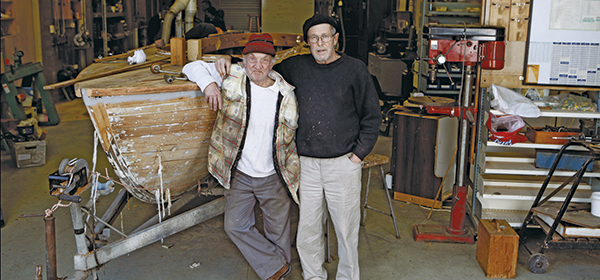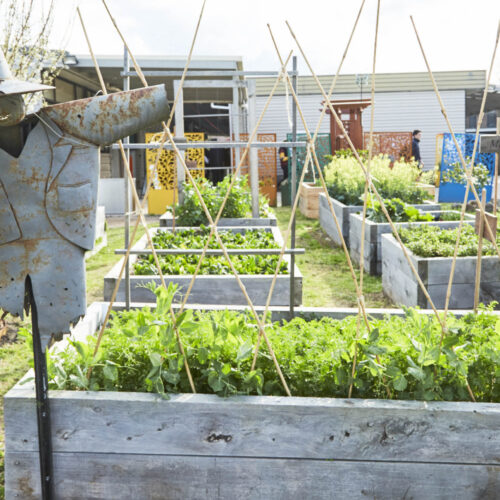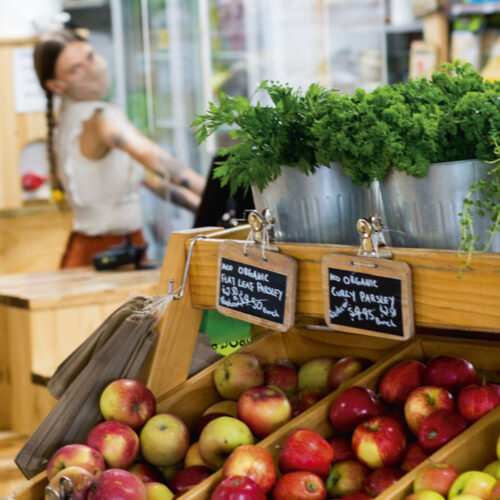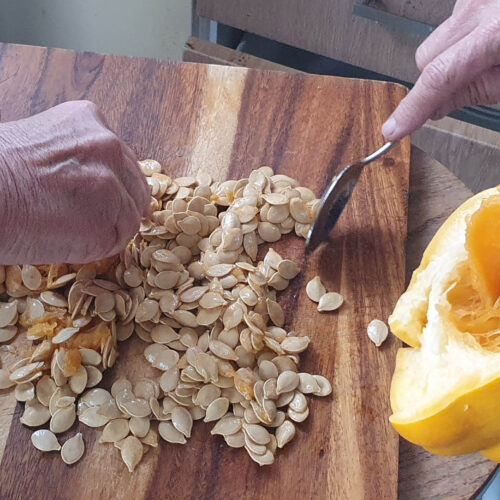Shedding some light
2012-08-19T02:17:58+10:00
Thousands of men (and women) are coming out of the woodwork as part of the Men’s Shed movement, finding a place for friendship, handiwork, community gardening and, ultimately, better wellbeing, writes LINDA COCKBURN.
Alistair Gray and retired carpenter Ron Locke were brought together when restoring an old wooden sailing boat at Hobsons Bay Men’s Shed.
Thousands of men (and women) are coming out of the woodwork as part of the Men’s Shed movement, finding a place for friendship, handiwork, community gardening and, ultimately, better wellbeing, writes LINDA COCKBURN.
All organisms start with a single cell. So it was with Men’s Sheds. The first ?one appears to have spontaneously arrived on the scene sometime in the late 90s in Lane Cove, Sydney. It survived the early adversity of all new community endeavours: lack of funds, apathy, and animosity from neighbours and local councils. Others soon followed.
These sheds not only offer a place to gather, tinker and build – rather than sitting at home alone on the couch – but a forum for friendship and somewhere to simply have a chat. The knock-on effect is improved health and wellbeing. Today there are more than 500 men’s sheds registered with the Australian Men’s Shed Association, and the number is continuing to grow.
As well, an evolutionary change is taking place – the movement is linking up with community gardens. The two have a natural affinity: they are resourceful places with a high recycled content and low funding needs. They are grassroots with a backbone of pure community; they seek to learn, teach, produce, share and improve the lives and health of all those who come within their sphere. Also, many sheds now call themselves “community sheds”, welcoming women and men of all ages.
Sharing the load
John Waters is the coordinator of Pete’s Shed, a men’s shed in Bridgewater, Tasmania (my home state), where they make possum boxes for Bonorong Wildlife Sanctuary, over-sized dice for those lacking dexterity, run mentoring programs for school-aged children and work on their own projects in between. When there’s spare time they feed off-cuts to the potbelly stove and chew the fat.
John was retrenched six years ago and struggled with depression until someone invited him to visit Pete’s Shed. Since then he has found a new lease on life and is now the president of the Tasmanian Men’s Shed Association, and is often called on to talk about the value of men’s sheds.
He tells stories of some of the more elderly men who, prior to becoming involved with the movement, visited their doctor on a weekly basis. Now it’s more like six months between visits. These men are a manifestation of the new adage, “retiring, not dying”.
Men’s sheds are a place to share camaraderie, skills, and revel in oil, engines, tools and woodchips. Men’s sheds are where lawnmowers are repaired, shelves made, things sanded back and supportive relationships built.
After visiting a number of men’s sheds in Tasmania, it quickly becomes obvious that while they have all sprung from that first shed, each has evolved differently, many preferring, like the Dog House in Geeveston, to be a “genderless” men’s shed. These genderless sheds welcome women at all times or have days and times set aside for them.
A winning combination
Sorell Men’s Shed, near Hobart, is a perfect example of the linking up of sheds, gardens and the community. For a start, it’s a tip shop with tools. It’s a sprawl of all kinds of workshops from auto electrics and woodworking through to a place where old microwaves are scavenged for earth magnets and washing machines for motors. These are, with patience and ingenuity, turned into wind turbines, four of which are mounted on the shed roofs to trickle-feed battery banks. This place is a hive of activity: students from the local high school are involved in a project to weld together a trailer, one shed is a display and sales centre for items made, and a group of intellectually disabled people come each week to get involved.
Follow the path between two of the workshops and you will discover a sunny 20m x 20m area of raised garden beds. It’s the end of the growing year when I visit, but even so tomatoes drip heavy from bushes, the last of the corn is ready for picking and herbs grow in gutted refrigerator bodies. It’s here that men from the shed can be found weeding or potting up plants.
I’m part of a visiting group and we are offered fresh produce. Most men’s sheds share food on a regular basis, either of the beer and BBQ nature or garden glut exchanges.
This growing trend is, well, growing. Kingston Community Garden, near Hobart, is three years old and its shed was added six months ago. The raised garden beds are having an additional area cultivated as a community enterprise where organic fruit and vegetables will be grown and sold. The money raised will go towards improving the joint garden/shed venture.
Men’s sheds and community gardens are linking together, such as at Kingston in Tasmania.
“We have the shed blokes who don’t do gardening and the gardening blokes who don’t do sheds,” says coordinator David Ellis. “But both complement each other. The shedders built the gardeners a garden shed, compost bins and raised garden beds, and there are people who started off as a shedder but are now in the garden too. It just makes sense for them to come together.”
Funding the movement
Most men’s sheds work on the smell of an oily rag, and are usually run on a volunteer basis with community support or donations keeping them going. This is probably one thing that holds back expansion.
“I believe the cost of running a men’s shed is the cost of coffee,” says The Central Men’s Shed coordinator Fred Merrey, referring to the frequent breaks throughout the day. Their shed at Newtown (Hobart) has four or five men working on individual projects when we visit. One is making a wooden box, another working timber on a lathe. A sign above their heads reads, “If anything goes wrong today it’s Chris’s fault”, with a line-up of 15 or so names to be slotted in as and when required.
However, the reality is that the sheds require a little more than just money for coffee. Beyond Blue was one organisation to quickly catch on to the value of supporting men’s sheds financially. Men account for ?78 per cent of suicides in Australia. While, unfortunately, there is not a nice tidy figure on how much that could be reduced if men had someone to talk to, as all the shedders tell me, “Men don’t talk face to face, they talk shoulder to shoulder”.
Men’s sheds provide a place that reduces some of the causal factors of social isolation and lack of purpose. They are an invaluable drug-free aid to improving men’s – and women’s – health. They increase skills, make greater use of waste materials and provide the kind of glue that holds people and places together.
Ken Sullman from Sorell Men’s Shed puts it this way: “The earth has a low frequency, just like our bodies. Our lifestyles [and] all the things around us – computers, radios – they’re all high frequency and it stresses us. Community gardens [and sheds] are the perfect place because they bring you back to earth, put you back in sync, earth you.
“Everything we grow in the garden we split up amongst ourselves and share. Not everyone gets into the garden. We might have a working bee out there and everyone starts off in the garden, but some don’t last long and slink back inside. Others have a foot in both camps.”
Sprouting sheds
How to find a men’s shed near you.
That single-celled organism in the late 90s increased to 150 men’s sheds around Australia in 2009. By 2010 there were 300, and last year saw that figure rise to over 500, and it continues to grow. The Australian Men’s Shed Association (AMSA) is the peak body that seeks to provide not only financial support through a grants system, but a comprehensive manual on how to establish a men’s shed, advice on how to source affordable insurance, a website that provides links to resources, and a way to quickly find your closest men’s shed. If there is not a community shed in your area, seek out your closest community garden and ask if there’s one in the planning.
See mensshed.org.






